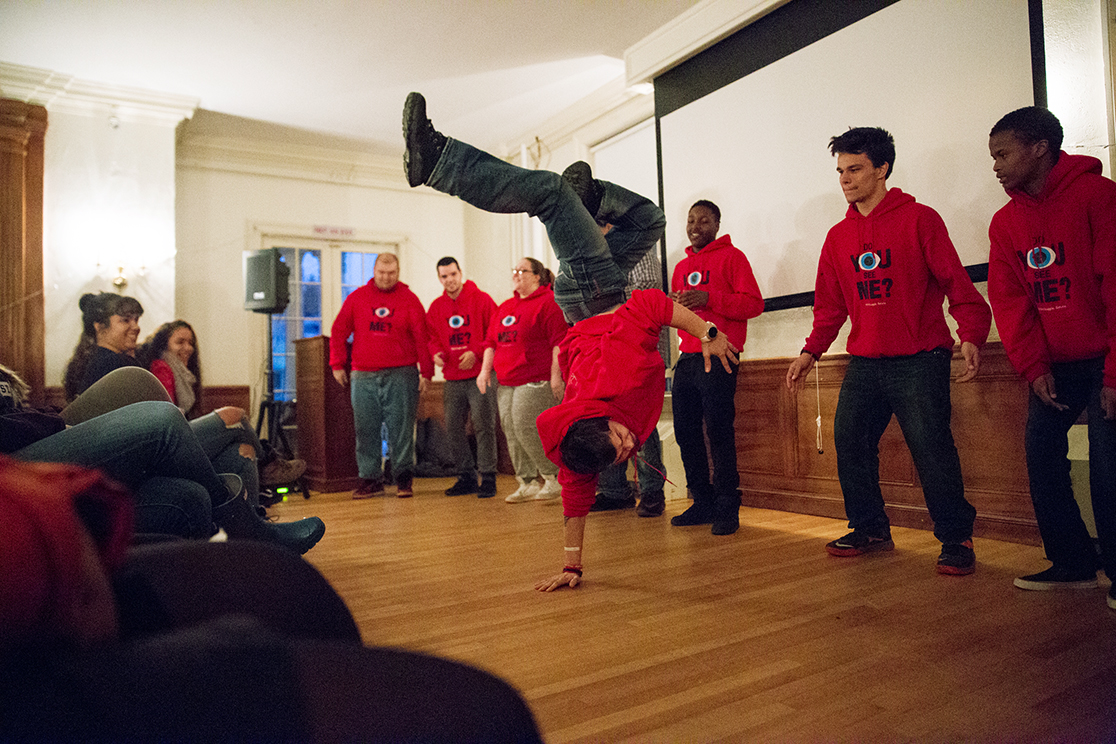Inside Out theater group brings formerly incarcerated youth to Howell
April 7, 2017
 Ann Basu
Ann BasuThis past Tuesday, Howell House hosted Maine Inside Out, a nonprofit group founded in 2007 with the goal of empowering currently and previously incarcerated youth through theater. The members performed compelling acts on topics like police brutality, racism, xenophobia and the school-to-prison pipeline. Phrases like “When schools neglect, the streets accept,” rang throughout the performance, giving the audience a personal perspective from the inside out.
The effort to bring Maine Inside Out to campus was led by Interim Assistant Dean for Upperclass Students Abbey Greene-Goldman, Director of Writing Project Kathleen O’Connor Howell House member Mackenzie Schaefer ’19 and Diamond Walker ’17.
“America places this huge emphasis on education as the key to success,” said Walker. “But a huge reason why the performers didn’t succeed was because they weren’t being heard and seen in school … There was one particular performer who said when the schools neglect, the streets accept. And I just thought, that’s so real. When school doesn’t relate to a kid’s life, of course they’re going to be disengaged.”
In addition to providing a theater platform for its members, Maine Inside Out also offers leadership positions, various forms of emotional support and a stipend for members to create art. Margot Fine, co-director and co-founder of Maine Inside Out, mentioned that the original intent of this organization was to empower through agency and transformative justice.
“They have been a family, a structured group or place I can go to when everything else in my life was crazy and not stable,” said Sofia McMullin, a member of Inside Out.
“For the months I was drinking [every day], I always made it to every single Maine Inside Out meeting. They brought me to the hospital when I needed it. They gave me love, food, stipend, money. They were there for me. I eventually came out of it, I’m still going strong every day. They’ve given me family and they’ve given me hope and they’ve given me a voice,” added McMullin.
Another member of Inside Out spoke of structural issues with mass incarceration and the long term effects that juvenile detention has on youth.
“Everyone makes mistakes, the only ones that go to jail are the ones that get caught. To box someone up like a caged animal for years, that is not the way to go. It messes them up mentally, it changes who they are, it makes them more angry at society,” remarked Abdulkadhir Ali, a member of Maine Inside Out.
Following the performance, the floor was open to the audience to ask questions; the performers’ enthusiasm permeated the audience, prompting bouts of laughter, raw moments of personal storytelling and opportunities for reflection for everyone involved.
As the members of Inside Out concluded their performances, Ali stood up at the front and left an important lesson for the audience.
“We are a reflection of who you are,” he said. “Now, do you see me?”
The audience in Howell House, filled with students, faculty and town members, absorbed this powerful moment of reflection before a standing ovation.
“I think this by far is one of the most powerful things I’ve ever experienced, right in front of me,” said Marisa O’Toole ’17.
According to Walker, the personal stories and perspectives shared on Tuesday evening provided an opportunity for Bowdoin students and faculty to connect with the people that they read about in their studies but may not encounter in their day-to-day lives.
“I was afraid we could get too academic with this topic—we could learn about it and feel bad but not do anything about it,” Walker said. “Because people at this school don’t really have the human connection with this topic … I want people to recognize that there are many second-class citizens in this world and as we go on in our careers, it’s important to fight for their voices as well.”
Ali added to that sentiment, noting the importance of community and the need to avoid ostracizing those around us.
“From [the student’s] perspective, try to notice the people that are hurting, maybe your classmates, maybe your family members, or whatever. And try to comfort them. They are just lonely, they need a way to open, some poeple are closed in. That’s why they’ve been like that their whole life. At least you can give that easy helping hand or smile. Help any way you can,” said Ali.

Comments
Before submitting a comment, please review our comment policy. Some key points from the policy: